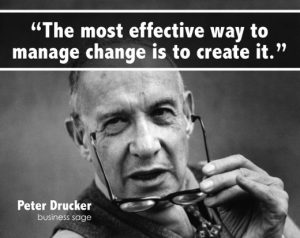7 Lessons on Life and Business Learned from Peter Drucker
 For 10 years, Peter Drucker was a mentor and friend. Here’s what I learned from him…
For 10 years, Peter Drucker was a mentor and friend. Here’s what I learned from him…
I’ll share a personality flaw with you; I’m not much of a follower, which is likely why I’m an entrepreneur. Yet, some people cast a light so bright that you can’t help but follow the path they illuminate into the future. Peter Drucker was one of those people.
Drucker may have been the 20th Century’s most-influential business thinker. Though he wrote 39 books, most of what I know about him came from a more casual context; across a lunch table at his favorite Italian restaurant, on the couch of his modest Claremont ranch, or over dinners and glasses of Merlot at the Hotel Del Coronado.
For a decade Peter was a mentor and a friend. Our conversations, faxes, and letters (no, he didn’t do email) influenced my thinking more than any other person. My memories of him are vignettes of a brilliant yet amazingly unassuming person.
I met Drucker in the mid-90s at his suburban Claremont home; a tiny ranch set on a small lot with furniture that looked as though it had been borrowed from the set of The Brady Bunch. The modesty of the place stood in such stark contrast to the über-guru status Drucker had achieved.
Our many conversation traversed the 20th Century like walks through a magnificent library; each one meandering through aisles filled with volumes of firsthand accounts from his work with an array of characters and companies, from U.S. Presidents and industry leading CEOs, to cardinals and bishops.
What I learned during the ten years I knew him has stayed with me as a sort of manifesto for building an extraordinary organization and an equally extraordinary life. Here are some of his most memorable insights.
1. Don’t just manage, lead
Drucker had a problem with the concept of managing knowledge workers. He felt that leadership was increasingly becoming a shared responsibility. He believed in pushing down decision-making to those closest to the process. To lead, in Drucker’s mind, was to empower people by providing the resources for success rather than a roadmap with turn-by-turn directions. If that frightens you, he said, then you have the wrong people leading your organization.
2. The way to keep good people is to give them a chance at the moon
During the 20 years I was building my company, we didn’t lose a single one of the eight people on our senior leadership team. The same was true of nearly all of our top performers. We compensated people fairly, but that’s not why they stayed. Drucker taught me that what drives the best people is a challenge that allows them to reach beyond themselves to be part of something greater. It’s what Peter Diamandis calls a “moon shot,” a goal so large it creates a gravity to draw people to it and keep them in its orbit. Besides, challenge only scares off the people that you need to scare off.
3. Before figuring out how it should be done, ask why it’s being done
Drucker had an issue with using Industrial Era metrics for the Knowledge Age. He felt that all too often we streamline tasks without first asking why the task is being done to begin with. One of the simplest yet most profound lessons I learned from Drucker was to always question the task’s reason for existence before fixing it; does it add value, and if so, how? Drucker was a master at asking questions. In the ten years I knew him I’m not sure he ever actually answered a single question of mine directly. Instead he would almost always rephrase or reframe my questions. Challenging conventional wisdom was his forte — he often called himself an “insultant,” who scolded people for a fee. It taught me to never be afraid or ashamed to say, “I don’t know,” and to ask “why?” until I did.
4. If you are bored it’s your fault
Drucker didn’t tolerate laziness. He was constantly in motion. I once asked him if he felt he shouldn’t slow down at some point — this was when he was about 90. His response was that hard work was bad only for those people who didn’t have purpose or passion. If you have a reason to work hard and/or a passion for what you do then there will never be enough hours in the day. But Drucker also balanced work with great passions in other areas of his life: his teaching, his love of Japanese art, and his willingness to mentor and pay it forward.​
5. Treat your employees as though they were volunteers
This is one of those perspectives that is completely unintuitive when you first hear it. Drucker spent the last part of his career working a great deal with nonprofits and volunteer organizations. He wanted to bring business acumen to nonprofits but he also believed that for-profit organizations could learn a lot from how non-profits attracted volunteers. “Volunteers,” he would say, “leave at the end of the day and only come back if they want to.” When you think about the work ethos among Millenials and Gen Z, who need a deep sense of social purpose in their work, it’s obvious that Drucker was ahead of his time.
6. Abandon the past. (No, really, I mean bury it!)
How do you manage the accelerating pace of change? You do it by “organized abandonment” — consciously killing off yesterday. Drucker chose his words carefully. One of my favorite quotes of his is that “the hardest thing to do is to keep a corpse from rotting.” Yeah, not a pleasant thought, but how often do companies hold onto the past with their best and brightest while the future passes them by? Not a bad lesson in business and in life.
7. Be humble
This last one is how I’ll best remember Peter Drucker. If anyone had a reason to be boastful and arrogant, it was Drucker. He had been on the front lines of more change than a hundred men and women could see in a lifetime. Yet he was anything but arrogant. Drucker had no reason to mentor me and offer his time, but he did.
The last letter I received from him was in response to a very grateful thank-you note from me for his mentorship and his decade of professional and personal guidance. He responded to my praise by saying, “Tom, even if I apply a discount of 90% to what you have said, it is still far too kind.” That was Drucker; brilliant, gracious, and humble.
We would all do well to follow his lead.
This article was originally published on Inc.
Wait! Before you go…
Choose how you want the latest innovation content delivered to you:
- Daily — RSS Feed — Email — Twitter — Facebook — Linkedin Today
- Weekly — Email Newsletter — Free Magazine — Linkedin Group
 Tom Koulopoulos is the author of 10 books and founder of the Delphi Group, a 25-year-old Boston-based think tank and a past Inc. 500 company that focuses on innovation and the future of business. He tweets from @tkspeaks.
Tom Koulopoulos is the author of 10 books and founder of the Delphi Group, a 25-year-old Boston-based think tank and a past Inc. 500 company that focuses on innovation and the future of business. He tweets from @tkspeaks.
NEVER MISS ANOTHER NEWSLETTER!
LATEST BLOGS
How Brexit Has Affected UK E-commerce Businesses
Photo by Zyro on Unsplash The popularity of online shopping was already growing at an impressive rate – and…
Read MoreOvercoming range anxiety: three tips for EV owners
Photo by Jenny Ueberberg on Unsplash In the last few years, electric vehicles (EVs) have become more and more…
Read More


